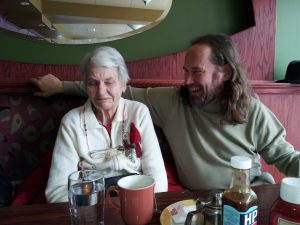 My name is Dan and this is part of my story, my life as it stands now…
My name is Dan and this is part of my story, my life as it stands now…
I am a caregiver to my in-laws. We got them to move in with us a couple of years ago. How many guys actively work to get their in-laws to move in, in order to become their main caregiver? Let me explain.
My sister has been bitten by the same bug, as long ago she decided she would take care of Mom whose Alzheimer’s is progressing more and more rapidly now. I take Mom one day a week both to help relieve my sister’s burden and to enjoy her while I can.
Much earlier in this life I worked as an orderly, both on a cancer ward as well as in long term care: both were moving and disturbing experiences. But a decade or so ago I found myself set free from career, family and possessions as my family blew up, my children grew up and I was free to go and do whatever I felt led to do. I found myself drawn to help my close friend and former Prof with the care of her chronically ill husband who also happened to be one of my best friends. For the next 2 years I devoted 2-7 days a week to his care: in fact he died peacefully in my care while his wife was in China. As it became clear he was going to leave on my watch, I more than once said aloud to myself and God, “I didn’t sign up for this.”
Now I have signed up for this. I am willingly supporting my in-laws as far as I’m able on the final leg of this journey of theirs. I am doing so as long as the best life they can lead is living with us. They are both 90 now, with varying levels of dementia, but so far functioning quite well. I do know where all this is heading though as my now-deceased friend was suffering from MSA (multiple system atrophy) a degenerative brain disease, and so I lived with some interesting takes on reality, a reality I just learned to share so that he had company and empathy.
As my business partner and best friend Claire Marson likes to say, “there’s no logic-ing dementia!” I can tell you it is both a joy and a trial to take care of those whose cognitive issues make everyday life more interesting and challenging.
So I’m starting this blog now to share my journey with others who might be care-givers, or family members of caregivers, particularly where there is dementia. These wonderful human beings, despite the losses of function and capacity are still very much present, and very human.
As Kay Branson says:
Yet, when one genuinely needs our help and we are able to give it, we feel enriched by serving. Over time, we become the anchor or the rock in someone else’s life. We balance the richness of our feelings with the challenges of caregiving. Where they are weak, we are strong. Where they are fearful, we face each day with courage. Where they try to make sense of their world, we provide comfort.
